 |
| |
|
MOSES Conference Keynotes on YouTube
|
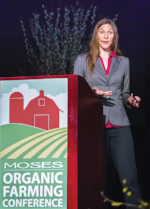
Keynote speakers Mas Masumoto and Liz Carlisle, both authors, encouraged farmers to share their individual stories and the movement's collective story to spread the environmental values of organic and sustainable farming beyond farm borders. Their inspiring keynotes are online here. You can also watch the one-woman performance of "Turn Here Sweet Corn," from Atina Diffley's memoir, and learn about the 2017 MOSES Organic Farmers of the Year.
Audio recordings of conference workshops are available online as CDs (two per workshop) for $8, which includes shipping. MP3 downloads are $5. The complete set of workshop recordings is $75, and comes on a USB flash drive.
|
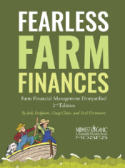 MOSES has just published the second edition of Fearless Farm Finances, a 270-page book that covers the financial aspects of farming, including recordkeeping systems, financial statements, assessing investments, working with a lender, and how to use farm numbers to make market and pricing decisions. This edition contains new information and worksheet templates for farmers who use paper-based systems, a new chapter on farm transition, an updated chapter on farm business structures, more farmer profiles, and updated resources. The update was funded by a grant through the USDA Beginning Farmer and Rancher Development Program. MOSES has just published the second edition of Fearless Farm Finances, a 270-page book that covers the financial aspects of farming, including recordkeeping systems, financial statements, assessing investments, working with a lender, and how to use farm numbers to make market and pricing decisions. This edition contains new information and worksheet templates for farmers who use paper-based systems, a new chapter on farm transition, an updated chapter on farm business structures, more farmer profiles, and updated resources. The update was funded by a grant through the USDA Beginning Farmer and Rancher Development Program.
|
|
Farm Production Recordkeeping Workbook
|
MOSES has created a workbook with recordkeeping forms that can be used both for crop insurance and organic certification--a valuable way to optimize your recordkeeping time when you are participating in both of these programs. For crop insurance, these forms can help you prove your production activities were sufficient to produce a crop in order to receive a payment due to losses caused by weather or market issues. The forms are applicable for multi-peril commodity crop insurance and whole farm revenue protection. You may also use the forms to verify compliance with the organic rules. The forms are also available online as Excel spreadsheets.
|
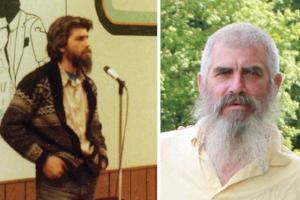
Dave Engel, a Wisconsin organic farmer and titan in the organic world, passed away March 14. His memorial service takes place this Saturday, April 8, at Sugar Creek Bible Camp in Ferryville, Wis. The Engel family and MOSES have established a scholarship fund in Dave's name to send farmers to the annual MOSES Organic Farming Conference, which Dave helped establish. Contributions can be made here--please note that you are donating to the David J. Engel Memorial Scholarship.
|
The National Organic Standards Board meets April 19-20 in Denver. The board is taking public comments via a webinar Thursday, April 13, from noon to 3 p.m. CDT. Click here for webinar details and meeting agenda. Read more about topics that will be discussed at the meeting in this Inside Organics blog post by Harriet Behar.
|
|
Organic Check-Off Comment Deadline
|
The USDA has extended the deadline to comment on the proposed rule for an
Organic Research, Promotion, and Information Order
to April 19, 2017. The proposed rule would establish a framework to pool resources to develop new organic markets, strengthen existing markets, and conduct research and promotion activities. Producers and handlers with gross organic sales greater than $250,000 for the prior marketing year would contribute one tenth of one percent of net organic sales, while others would have the option of being voluntarily assessed to participate in the program. The Agricultural Marketing Service has
a fact sheet about the proposed check-off here
. Farmers at the MOSES Conference earlier this year discussed the pros and cons. Read highlights here.
|
|
Cover Crop Research Project
|
The Ecdysis Foundation in South Dakota is seeking farmers for a research project on how cover crop diversity affects insect communities. Farm fields should be a minimum of 10 acres, have had a fall-planted cover crop in an annual cropping system, and no insecticide sprays in the past 12 months. The cost is $200 per field, which is negotiable based on affordability. The foundation will send supplies and instructions for conducting the experiment, and return an inventory of the beneficial and pest insects present in each field of cover crops. Participants will not be identified in published results. When completed, this project will provide a comprehensive dataset on plant diversity and the function of agroecosystems.
|
The Minnesota Institute for Sustainable Agriculture and Minnesota Farmers' Market Association have released new "Local Food" fact sheets for farmers and sellers of local food. The series provides a comprehensive look at ways locally grown foods can be sold, and the regulations that apply to each.
|
The USDA Farm Service Agency recently updated a brochure on production contracting with farmers. The new guide is Contracting in Agriculture: Making the Right Decision, Information for Farmers from USDA. It is also available on the Farm Service Agency and National Sustainable Agriculture Coalition websites. This guide is designed to help landowners and farmers understand production contracts, as well as important issues to consider before entering into a contract. A source list for more information on contracting is also included at the back of the guide.
|
Each material on the USDA organic National List of approved or prohibited substances is reviewed every five years in order to remain on the list; this is called the "Sunset" review. In fall 2015, the National Organic Standards Board reviewed 198 of these materials and renewed 187. In addition, the NOSB and the National Organic Program, reorganized these sunset dates to avoid this large amount of reviews in the future, so some of these items remaining will be reviewed again in less than five years to stagger the workload. Synthetic lignon sulfonate used as a floating agent in post-harvest handling was not renewed for crops, and furosemide was not renewed for livestock. The remainder that were not renewed are for processed organic foods and include egg white lysozyme, three boiler chemicals, magnesium carbonate and tetrasodium pyrophosphate. These agricultural products were no longer considered unavailable as organic and were not renewed: chia, dillweed oil, galangal, inulin-oligofructose enriched, lemongrass, chipotle chile peppers, Turkish bay leaves and whey protein concentrate.
|
|
Guide to Federal Programs for Farmers
|
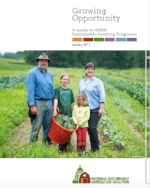 The National Sustainable Agriculture Coalition has partnered with USDA's Farm Service Agency (FSA) to produce a one-stop guide to USDA services for family farmers and ranchers. Growing Opportunity: A Guide to USDA Sustainable Farming Programs is a free resource that is now available online as well as in FSA's 2,600 county offices. The 28-page guide details dozens of USDA programs to help farmers and ranchers start, maintain, and grow successful operations. The National Sustainable Agriculture Coalition has partnered with USDA's Farm Service Agency (FSA) to produce a one-stop guide to USDA services for family farmers and ranchers. Growing Opportunity: A Guide to USDA Sustainable Farming Programs is a free resource that is now available online as well as in FSA's 2,600 county offices. The 28-page guide details dozens of USDA programs to help farmers and ranchers start, maintain, and grow successful operations.
|
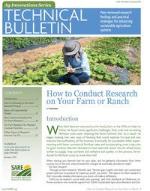 USDA SARE has published a newly revised version of their bulletin: How to Conduct Research on Your Farm or Ranch. The bulletin provides an introductory guide to on-farm research that includes examples of real-life projects and challenges to consider. Copies are free online, in print, and as a PDF download. USDA SARE has published a newly revised version of their bulletin: How to Conduct Research on Your Farm or Ranch. The bulletin provides an introductory guide to on-farm research that includes examples of real-life projects and challenges to consider. Copies are free online, in print, and as a PDF download.
|
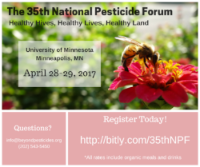 Beyond Pesticides hosts the 35th National Pesticide Forum April 28-29, 2017 at the University of Minnesota in Minneapolis. The forum arms grassroots advocates, scientists, and policy makers with information to impact local, state and national policies to protect human health and the environment. Speakers include John Mesko of MOSES, Jeff Moyer of Rodale Institute, and Liz Carlisle, author of Lentil Underground. Beyond Pesticides hosts the 35th National Pesticide Forum April 28-29, 2017 at the University of Minnesota in Minneapolis. The forum arms grassroots advocates, scientists, and policy makers with information to impact local, state and national policies to protect human health and the environment. Speakers include John Mesko of MOSES, Jeff Moyer of Rodale Institute, and Liz Carlisle, author of Lentil Underground.
|
|
Wisconsin Organic Advisory Council
|
The Wisconsin Organic Advisory Council is taking applications through April 30 for farmers, business owners, and others who want to advise state agencies and organizations on critical issues to organic production, processing and purchasing. Wisconsin ranks second in the nation for the number of organic farms. Members serve three-year terms and attend quarterly meetings. Selected council members begin serving at the July meeting. For more information or to receive application forms, call 608-224-5095.
|
The Tiny Crop Report is a new e-publication to help small-scale farmers connect directly with restaurants, craft brewers, and independent grocers within 250 miles. It is free for farmers to list available crops; buyers pay to receive the report, which is published 20 times a year.
There are
seven regional editions: Great Lakes, Great Plains, Mid-Atlantic Coast, Northeast, Pacific Coast, Rocky Mountain and Southeast. Farmers list their crop types, availability dates, quantity, pricing, and shipping methods. The report limits the number of listings for any one crop in order to balance the varieties of available crops, and to drive sales to the farmers who help build out the initial reports.
|
|
Sustainable Farming Podcasts
|
ATTRA has created podcasts called Voices from the Field that delve into topics of interest to sustainable farmers. The podcasts range from 7 to 20 minutes and focus on cover crops, farm energy efficiency, meat processing, marketing, and more.
|
|
The MOSES website has many new job posts, classified ads, land listings, and events to help you grow. Check out these resources:
|
|
Farm internships + help wanted
|
|
Buy, sell, rent farmland.
|
|
Find equipment, crops, livestock, more.
|
|
|
 |
|